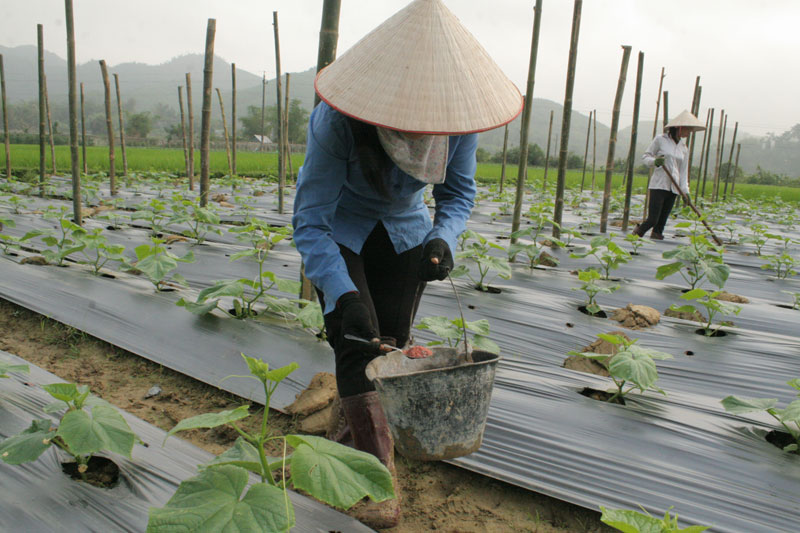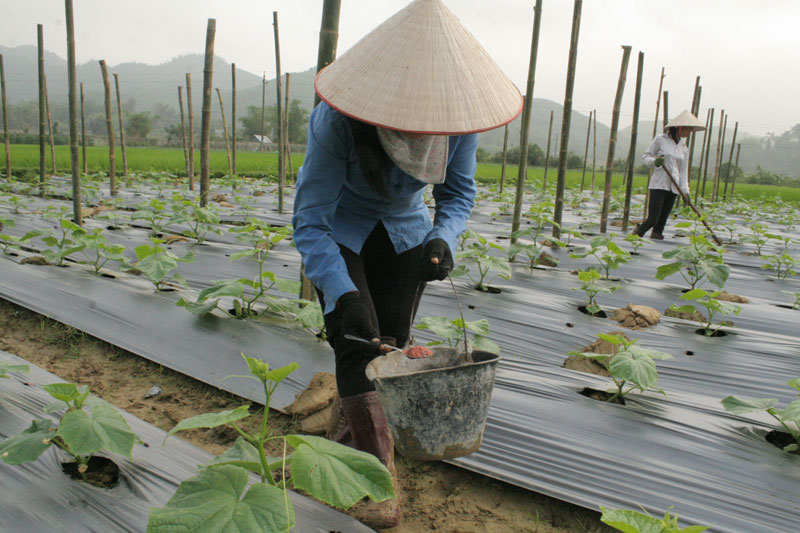
(HBO) - Mr. Bui Thanh Suot, the Chairman of Du Sang commune People’s Committee (in Kim Boi district) said that there are 13,000 households in the commune, 5,900 communal people are living in the area of 17 villages.
Bua Sao village - a village of the commune has changed the plant structures successfully and strongly. Along with maintaining the area for rice, people forcefully convert to plant zucchini. In the latest season, Bua Sao peasants had a harvest season with high price. According to the zucchini grower here, during the period of 4-5 months in this year, at first zucchini was sold with the price of 15,000 dongs /kg, then on average about 10,000 dongs/ kg. Accounted for each hectare, farmers could earn from 250 to 300 million dongs. Along with zucchini planting, farmers also changed to plant various kinds of vegetables such as bitter melons, commercial cucumbers and beans. For a long time, the farmers have held 3 crops per year. Many households in Bua Sao also tender land in other areas for developing production. Because of changing the structures of plants and livestock, a lot of households have had a better life.

People of Sang Trong village in Du Sang commune (Kim Boi) investing in planting zucchini to improve their income.
The commune is divided into 3 areas: Du Sang A, Du Sang B and Du Sang C. Du Sang A includes these villages: Sang Moi, Sang Trong, Sang Ngoai, Doi Mu where the people mainly plant rice, crops and fruit trees. Du Sang B includes the villages of Bua Sao, Dong Bai, Go Bui, Bai Tam where the people make use of the gardening areas for planting zucchini, vegetables and tubers to provide for Ha Noi market. Du Sang C with the villages of Suoi Chuon, Suoi Than, Lam Truong, Suoi Bi which have hilly terrain so that the people can only develop forest trees.
The total area of cultivated land in the whole commune is over 1,000 hectares. The people actively apply science and technology in producing, and the productivity of plants and livestock has been remarkably increased. With an area of 272 hectares for planting rice, the average productivity reached 53quintals/ ha, the yield reached 1,442 tons. The area of planting corns is 320 hectares with the productivity of 48 quintals/ha and the yield of 1,536 tons. The remaining areas are used to plant zucchini, pumpkins, bitter melons for seeds, cucumbers, vegetables and kinds of beans. Especially, because of the project of restructuring agriculture of the district, the commune has recently implemented inter-production to attract enterprises to invest in the models of linking by the value chains, increasing the values, stabilizing the market of agricultural products. Many models of high economic efficiency have been deployed and expanded in the commune such as: the model of planting Japanese cucumbers integrating with Pacific Limited Company with the size of 8 hectares is being deployed in Sang Trong village; the model of planting Chinese peas integrating with Mien Bac Green Agricultural joint Stock Company; or the model of planting bitter melons and pumpkins for seeds with the size of 46 hectares in Dong Bai, Bua Sao, Bai Tam has earned million dongs per hectares. Besides, the commune is also developing more than 2,200 ha of forest area and 17 ha of fruit trees.
Along with planting, people are at the debut to invest in breeding livestock in merchandise- oriented way with about 1,400 oxen and buffaloes, over 5,200 pigs, 41,000 poultry, 135 goats and 12 ha of seafood.
Thanks to the active restructure of plants and livestock and strongly thinking and doing, the life of Du Sang people now has changed significantly. In 2017, the commune tried to reach the capita income of 15 million dongs/ person/ year. Up to now, it achieved 11/19 criteria of building new rural area.
According to data from the Hoa Binh Provincial Party Committee, the industrial production index for the first six months of 2025 is estimated to have increased by 20% compared to the same period last year. This marks the highest year-on-year growth rate for this period since 2020.
In the first six months of 2025, Hoa Binh province’s export turnover was estimated at 1.145 billion USD, marking an 18.11% increase compared to the same period in 2024. Import turnover was estimated at $ 804 million, a 17.15% increase, which helped the province maintain a positive trade balance.
The lives of the ethnic minority farmers in Tan Lac district have gradually improved thanks to the new directions in agricultural production. This is a testament to the collective strength fostered through the professional associations and groups implemented by various levels of the district’s Farmers’ Union.
With the motto the "product quality comes first,” after nearly one year of establishment and operation, Muong village’s Clean Food Agricultural and Commercial Cooperative, located in Cau Hamlet, Hung Son Commune (Kim Boi district), has launched reputable, high-quality agricultural products to the market that are well-received by consumers. The products such as Muong village’s pork sausage, salt-cured chicken, and salt-cured pork hocks have gradually carved out a place in the market and they are on the path to obtaining the OCOP certification.
In the past, the phrase "bumper harvest, rock-bottom prices" was a familiar refrain for Vietnamese farmers engaged in fragmented, small-scale agriculture. But today, a new spirit is emerging across rural areas of Hoa Binh province - one of collaboration, organisation, and collective economic models that provide a stable foundation for production.
Maintaining growing area codes and packing facility codes in accordance with regulations is a mandatory requirement for agricultural products to be eligible for export. Recently, the Department of Agriculture and Environment of Hoa Binh province has intensified technical supervision of designated farming areas and packing facilities to safeguard the "green passport" that enables its products to access international markets.



